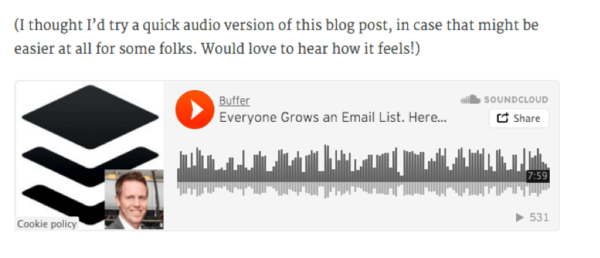5 Link-Building Techniques You’ve Been Neglecting
Tired of the same old link-building tactics? Columnist Pratik Dholakiya suggests some creative ideas to improve your link-building efforts.

Link building isn’t black and white, is it?
There are so many methods you could be using, but it feels like each one has been… well, overused. Frustrating, isn’t it?
However, I believe there are a lot of strategies out there that you’re not using — either because you have forgotten about them or are simply neglecting them. And they could make all the difference in your rankings.
If you want to find out the five you’ve been neglecting the most, read on…
1. IFTTT For Link Target Discovery Automation
If This Then That (IFTTT) is a beautiful platform that lets you automate a lot of your life. You can use it for social media, organizational tasks and sending those networking emails you always forget to send.
But you can also use it to automate your link-building strategies.
Now, let me be clear: This tool won’t be building the actual links for you. Instead, it helps with discovering and identifying potential link targets. Let me give you a few examples:
- As Neil Patel shows here, IFTTT can notify you whenever you get mentioned online (with or without link). This way, you can contact people and either ask for a link or ask if you can improve on the one they have.
- IFTTT can notify you of questions asked on Quora, Yahoo!, Twitter or other sites about topics in your niche, so you can provide the content to answer them.
- It can gather PR opportunities for you, from journalists or publications, so you can contact them immediately.
- It can show you when new sites are linking to your competitors so you can find out what content people are linking to most — or so you can investigate how to get a link from that same site yourself.
And, that’s just the start of it. There are hundreds of different “recipes” you can put together to optimize (and automate) part of your link-building process.
2. Helping Webmasters
I’m going to be a little blunt here:
Webmasters hate you.
Okay, that was more than a little blunt, but it needed to be said — because, for the most part, it’s true. Link builders and SEOs are (unfortunately) notorious for sending webmasters all sorts of irrelevant solicitation emails, including:
- Basic, poorly researched guest post ideas.
- Generic guest posts.
- Poorly worded emails asking for links.
- Offers of SEO services.
As Michael King pointed out in his Moz Whiteboard Friday, they get hundreds of these emails a week, and they’re growing increasingly sick of them.
So what can you do instead to build links from webmasters? Well, it simply comes down to networking principles. You need to help them.
Here are a few examples of what you can do to get a link, while helping a webmaster out properly:
- Let them know about broken or dead links on their site, and suggest updating the link to point to a piece of your content that fits perfectly and adds extra value to their post.
- Carefully read and review their old or flagship content. Then show them content or research you’ve done that improves upon or solidifies a claim that they’ve made. Webmasters often get most of their traffic through their older and more established posts, so giving them this opportunity to update this content and make it relevant again is a wonderful opportunity to build a relationship (and a link).
- Create a badge scheme, like your Top 100 SEO Blogs of the year, and give them a personalized badge to put on their site with a link back to you. This can add authority to their site and make them look more trustworthy to new visitors — a win-win for both of you.
3. Creating Audio Content
iTunes isn’t just for downloading your favorite tracks; it can also be a brilliant way to build backlinks for your site.
First, audio content can increase the accessibility of your content. The Buffer blog uses audio content from SoundCloud, to allow people to “read” their blog posts while taking on other tasks:
This can increase the number of people linking back to your content organically, because it suddenly becomes much more accessible to a whole new group of people.
Unfortunately, as far as I can tell, links from SoundCloud and iTunes are no-followed. However, these links are still a great source of referral traffic.
For example, British nutritionist Ben Coomber has used iTunes links to help build the backlink profile of his site, Body Type Nutrition, with over 175 podcast episodes.
You don’t need to have a star-studded podcast lineup to get these links, though. It can be as simple as recording your blog posts and providing a free download link at the start of your post.
This isn’t as expensive as you’d think, either. You can record for free using GarageBand, and you can pick up an external microphone for $30 to $40… which is a heck of a lot cheaper than buying a link, right?
4. Facebook Target Journalists
This method can cost you pennies to do, but it can result in some big link opportunities.
When you’re looking for backlinks from Press Releases, you tend to go to two places:
- The Publication: Find the right editor and shoot them an email.
- A PR Company: Spend hundreds or thousands of dollars getting them to do press releases for you.
But, according to Entrepreneur writer Anand Srinivasan, these can be a complete waste of time. Instead, it’s better to go directly to the journalists and have them create the piece, and the link, for you using their influence.
This can be done easily by using Facebook ads. Put together a list of journalists you want to contact and find their Facebook profiles. Then, create a target advert — using this tutorial here — to tell them what you’re looking for, and how to apply.
You can do this for almost pennies, and even commissioning a press release from them will cost far less than using a PR company.
5. Look For Click-To-Tweet Or Quote Opportunities
A lot of content creators use Click-To-Tweets (or CTTs) in their posts to add a viral component to them and bring a little extra authority to the table, like this one from Nichehacks:
And, if you’ve been blogging for a while, there’s a good chance you’ve been quoted, too. So do some research and find where you’ve been quoted and ask them to place a link over your brand name.
Or, if you’ve not been quoted anywhere, reach out to a site that is relevant to your niche and ask if you can be quoted in one of their upcoming articles. Create a quote, speak to the site owner and get it stuck into one of their posts.
The third strategy for this is to find round-up posts like this one, and ask to join in future ones with your insights. Most sites outsource these types of posts to freelance writers, so it also pays to find out who is writing these posts — possibly using the method from #4 above — and get in touch with them.
Stop Neglecting, Start Building…
There you have it, five neglected link-building strategies you can employ today. Here they are in brief, so you don’t have to read the article all over again:
- IFTTT Automation. Create recipes to automate discovery of potential link-building opportunities, like notifying you when you get mentioned anywhere on the web.
- Help Out Webmasters. Instead of asking for favors from webmasters, start giving them. Make your links and your approaches add value to webmasters, and you’ll see a big increase in responses.
- Create Audio Files For iTunes Links. Record a podcast episode for, or simply read out, each of your blog posts and put them on iTunes. It’s a simple and easy way to get a backlink that packs a lot of punch.
- Facebook Target Journalists. Instead of shelling out lots of money on PR companies, go directly to the journalists with access to publications through targeted Facebook Ads.
- Looks For CTTs and Quote Opportunities. Find where you’ve been quoted, or where you could be quoted, and get links that way. It’s simple, but it adds a lot of value to you and your brand.
So where are you going to start?
Note: An earlier version of this column had an error with regards to links from Apple iTunes being followed. That has since been corrected.
Contributing authors are invited to create content for Search Engine Land and are chosen for their expertise and contribution to the search community. Our contributors work under the oversight of the editorial staff and contributions are checked for quality and relevance to our readers. The opinions they express are their own.
Related stories
New on Search Engine Land




